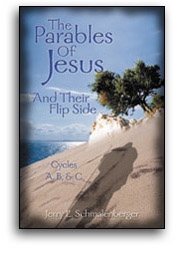SermonStudio
Some Tenants Are Better Than Other Tenants
Preaching
The Parables Of Jesus And Their Flip Side
Cycles A, B, and C
Some tenants are a lot better than other tenants. I found that out when, as a lad, I worked up the road on a farm owned by Walter and Esther Hupman. My job was to help candle eggs gathered on their egg route and exercise their English saddle horses.
The Hupmans couldn't begin to do all the farming themselves so they always had tenants living in a little house next to their unusual round barn. For farming the land the Hupmans owned, the tenants got to live in the house and receive a certain percentage of the income from the harvest.
The Hupmans couldn't begin to do all the farming themselves so they always had tenants living in a little house next to their unusual round barn. For farming the land the Hupmans owned, the tenants got to live in the house and receive a certain percentage of the income from the harvest.


